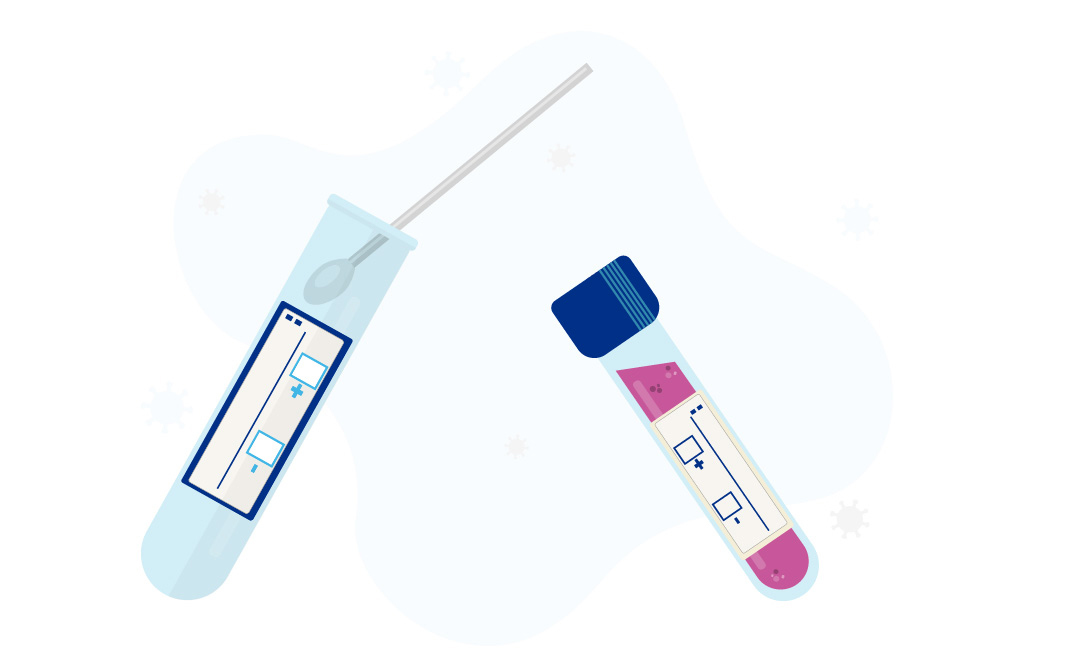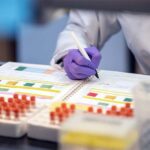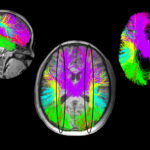COVID-19 tests: What families should know

As schools and businesses are looking to safely reopen during the COVID-19 pandemic, we’re hearing more about testing for COVID-19. But there isn’t just one “COVID-19 test.” All of the tests have one goal: to detect whether someone is or has been infected with the SARS-CoV-2 virus that causes COVID-19. But they work in different ways.
To learn more, we reached out to Dr. Alexander McAdam, director of the Infectious Disease Diagnostic Laboratory at Boston Children’s Hospital. Here, he answers questions about the various kinds of COVID-19 tests.
What are nasal swab tests?
When you think of COVID-19 tests, you probably imagine the nasal swab tests often depicted in the media. Nasal swabs — which resemble long cotton swabs — can detect an ongoing, active infection. But not all swabs are the same. Some swabs, known as nasopharyngeal swabs, collect respiratory secretions far back in the nose toward the throat, which can be uncomfortable.
Kids tend to do better with other kinds of swabs, such as those that probe only the inside of the nostril, or the back of the throat. But there’s a trade-off. These gentler swab tests are about 5 to 10 percent less effective at detecting the virus. Call your testing site ahead of time if you want to know what type of testing swab is used.
How do nasal swab tests work?
Where can my child get tested?
At Boston Children’s, all visits are currently by appointment only, and we cannot accept walk-in visits. This includes visits for blood draws, radiology, and COVID-19 testing. For COVID-19, we are only testing children who have symptoms of the virus or are undergoing surgery or another procedure within 48 hours. Your child’s clinician will determine if they need testing and will schedule that test. If you think your child might have COVID-19, please call your health care provider. Massachusetts residents can also find a nearby pediatric COVID-19 testing site on our COVID-19 website
Swab tests look for one of two things: the presence of the virus itself or a protein made by the virus, known as an antigen. In general, testing for the virus itself has proven to find more positive cases of infection than looking for antigens.
To detect the virus, most swab samples are tested with so-called nucleic acid amplified tests (NAATs), which are the most common type of COVID-19 test available now. “NAATs are the best tests for detecting the SARS-CoV-2 virus,” says Dr. McAdam. In fact, the vast majority of them find more than 90 percent of infectious COVID-19 cases. A caveat? Backlogs of these tests have delayed the time it takes to get results.
As for antigen tests, their main benefit is that they can be done quickly, with fairly immediate results. This is why they are often called “rapid tests.” A positive antigen test means you have an active COVID-19 infection. However, antigen tests are less sensitive than NAATs and miss 20 percent of positive cases.
What are blood tests for COVID-19?
You may have heard about “antibody” or “serology” COVID-19 tests. These blood tests look for antibodies your body makes in response to the SARS-CoV-2 virus.
Blood tests aren’t accurate if used very early after you’re infected with the virus. This is because it takes about a week or more for your body to produce antibodies after encountering the virus.
“Antibody tests are generally more useful when you are looking to see if someone has a past infection,” says McAdam. “They generally should not be done for testing for an active infection.”
Knowing if a person has previously been infected with the virus can be important, because it can tell how many people in a certain area have had COVID-19.
What about saliva tests for COVID-19?
Saliva-based tests can be started at home simply by spitting into a container and shipping it off to a lab where it will be tested. Sounds easy, but only a few labs can use saliva to test for COVID-19 and the tests aren’t yet widely available. It’s too early to say for sure, but testing saliva is probably slightly less effective for detecting SARS-CoV-2 than testing the deep nasopharyngeal swabs.
Get more answers about Boston Children’s response to COVID-19.
Related Posts :
-

Parsing the promise of inosine for neurogenic bladder
Spinal cord damage — whether from traumatic injury or conditions such as spina bifida — can have a profound impact on bladder ...
-

Unveiling the hidden impact of moyamoya disease: Brain injury without symptoms
Moyamoya disease — a rare, progressive condition that narrows the brain’s blood vessels — leads to an increased risk of stroke ...
-

Forecasting the future for childhood cancer survivors
Children are much more likely to survive cancer today than 50 years ago. Unfortunately, as adults, many of them develop cardiovascular ...
-

Genomic sequencing transforms a life: Asa’s story
Asa Cibelli feels like he’s been reborn. The straight-A middle schooler plays basketball and football, does jiu jitsu, is ...





